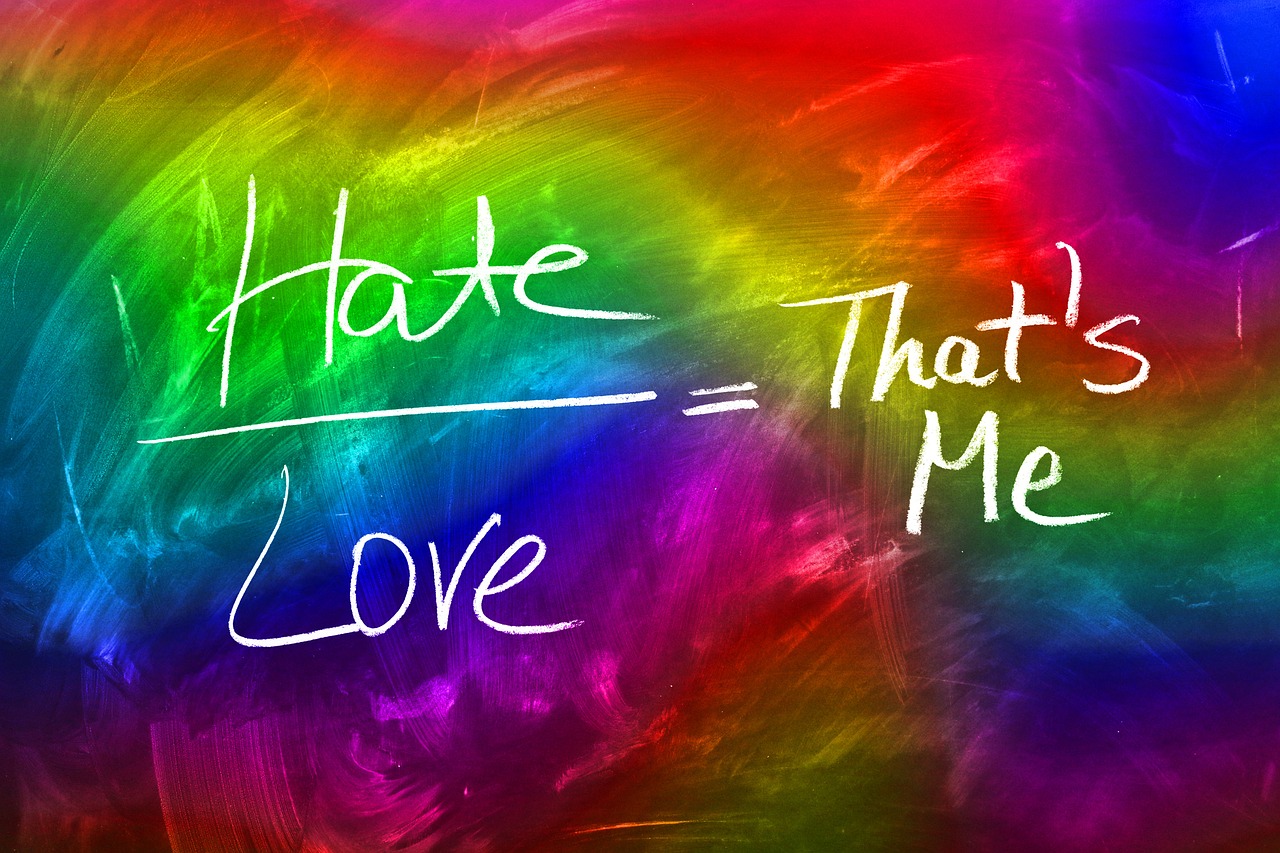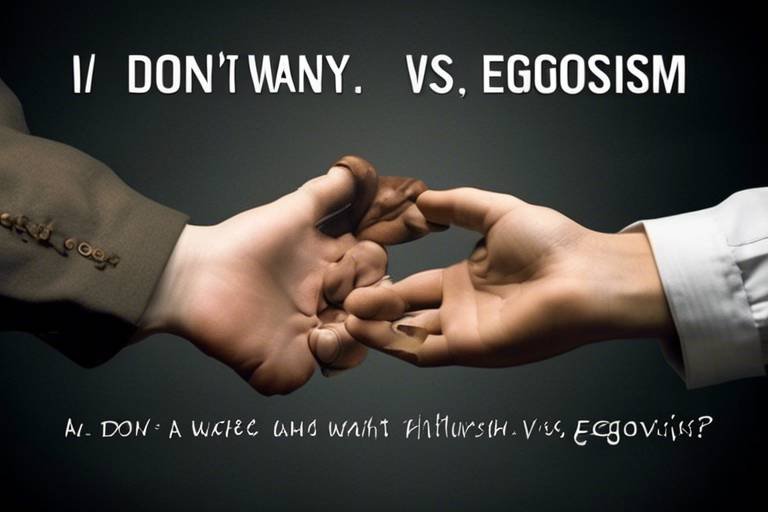Subjectivity and Objectivity - Philosophical Discourse
In the grand tapestry of human experience, the concepts of subjectivity and objectivity weave intricate patterns that help us understand our existence and the world around us. These two philosophical pillars are not just academic terms; they are lenses through which we interpret our daily lives, our interactions, and even the scientific discoveries that shape our understanding of reality. Imagine navigating through a dense fog—subjectivity is like the personal flashlight you carry, illuminating your unique path, while objectivity represents the broader landscape that exists beyond your individual beam of light. Together, they create a comprehensive view of the world, one that is both deeply personal and universally applicable.
At first glance, subjectivity may seem like a hindrance, a veil of personal bias that clouds our judgment. However, it is essential to recognize that our feelings, perspectives, and opinions are what make our experiences rich and meaningful. Each person's subjective experience contributes to a collective understanding of humanity. For instance, think about how two friends can witness the same movie but walk away with entirely different interpretations. One might focus on the emotional depth of the characters, while the other might be captivated by the cinematography. This divergence illustrates that subjectivity is not merely about personal bias; it is about the unique lens through which we view the world.
On the flip side, objectivity strives for a more detached perspective, aiming to present facts without the influence of personal feelings. In the realm of science, objectivity is crucial. Scientists work diligently to minimize bias in their research, employing rigorous methodologies to ensure that their findings are reliable and can be replicated. However, the quest for objectivity is not without its challenges. Personal experiences and societal contexts inevitably seep into the fabric of scientific inquiry. This interplay between subjectivity and objectivity raises important questions: Can we ever truly separate our personal biases from our understanding of the world? Or is the very act of observation inherently subjective?
Historically, the evolution of these concepts has been shaped by various philosophical movements. Existentialism, for example, places a premium on individual experience and choice, asserting that our subjective interpretations are fundamental to our existence. Thinkers like Jean-Paul Sartre and Simone de Beauvoir championed the idea that we are not merely passive observers of life but active participants who shape our own realities through our choices. This perspective has profound implications for how we understand personal identity and meaning in a world that often feels chaotic and unpredictable.
Meanwhile, phenomenology offers another fascinating lens through which to examine subjectivity. By focusing on the structures of experience and consciousness, phenomenology allows us to delve deeper into how we perceive and interpret our surroundings. It encourages us to explore not just what we experience but how we experience it, revealing the rich tapestry of human consciousness. This philosophical approach has influenced various fields, from psychology to the arts, emphasizing the importance of understanding subjective experience in shaping our reality.
As we navigate through the complex interplay between subjectivity and objectivity, it becomes clear that these concepts are not mutually exclusive. In fact, they often coexist and inform one another. Consider the realm of art and literature, where the subjective experiences of the creator are expressed through objective forms. Artists and writers strive to convey universal truths while drawing from their personal narratives. This delicate balance allows for a rich dialogue between the subjective and the objective, creating works that resonate on multiple levels with diverse audiences.
In conclusion, the philosophical discourse surrounding subjectivity and objectivity invites us to reflect on our own experiences and the ways in which they shape our understanding of the world. By recognizing the interdependence of these concepts, we can foster a more nuanced appreciation of human experience, one that embraces both the personal and the universal. As we continue to explore these ideas, we may find that the fog of subjectivity and the clarity of objectivity together illuminate our path toward greater understanding.
- What is the difference between subjectivity and objectivity?
Subjectivity refers to personal perspectives and feelings, while objectivity aims for an unbiased view of facts and reality. - How do subjectivity and objectivity interact in science?
While science strives for objectivity, personal biases can influence research outcomes and interpretations. - Can art be objective?
Art often reflects subjective experiences, yet artists may strive for objectivity in how they express deeper truths. - Why is understanding both concepts important?
Recognizing the interplay between subjectivity and objectivity enriches our understanding of human experience and fosters empathy.

Defining Subjectivity
Subjectivity is a fascinating concept that revolves around the personal perspectives, feelings, and opinions that shape our individual experiences. Think of it as the unique lens through which each person views the world. Imagine two people watching the same movie; one may find it thrilling while the other thinks it's boring. This difference in perception stems from their subjective experiences, influenced by their backgrounds, emotions, and personal biases. Understanding subjectivity is crucial because it helps us recognize how these personal biases can influence our interpretations and judgments in various contexts, from everyday conversations to complex philosophical debates.
At its core, subjectivity is about the individual experience. It begs the question: how do our feelings and thoughts shape our reality? This is where things get interesting! Subjectivity not only colors our perceptions but also plays a vital role in how we interact with the world around us. For instance, in the realm of art, a painting can evoke a myriad of emotions based on one's life experiences, cultural background, and even mood at the time of viewing. This is why art can be so powerful and transformative; it speaks to the individual in ways that are deeply personal.
Moreover, subjectivity can be both a strength and a limitation. On one hand, it enriches our lives by adding depth to our experiences and fostering empathy. On the other hand, it can lead to misunderstandings and conflicts when differing perspectives clash. For example, in discussions about controversial topics, individuals often find it challenging to see beyond their subjective viewpoints, leading to polarized opinions. This is why developing critical thinking skills and practicing active listening are essential in navigating conversations that involve subjective experiences.
In summary, subjectivity is an intrinsic part of the human experience. It shapes how we perceive reality, influences our interactions, and enriches our understanding of the world. By acknowledging the role of subjectivity, we can foster a more compassionate and open-minded approach to communication and understanding in our everyday lives.

Defining Objectivity
Objectivity is a fundamental concept in both philosophy and science, representing the practice of perceiving and presenting information without the influence of personal bias or subjective interpretation. It is the gold standard for many fields, particularly in scientific inquiry, where the goal is to uncover truths about the natural world that are not swayed by individual opinions or emotions. Imagine trying to solve a mystery; if you let your personal feelings cloud your judgment, you might overlook crucial evidence. Objectivity acts as a clear lens, enabling us to see the facts as they are, stripped of our preconceived notions.
In essence, objectivity is about maintaining a neutral stance—it's like being a referee in a sports game, where fairness and impartiality are paramount. This quality allows researchers, scientists, and decision-makers to draw conclusions based on evidence rather than personal beliefs. For instance, in a scientific experiment, the results must be replicable regardless of who conducts the study. If one person’s biases affect the outcome, it undermines the entire process. Thus, objectivity is not just a nice-to-have; it’s essential for the credibility and reliability of knowledge.
However, achieving true objectivity can be a challenging endeavor. Our experiences, backgrounds, and emotions inevitably shape our perceptions, making it nearly impossible to be entirely free from bias. This is where the interplay between subjectivity and objectivity becomes crucial. While we strive for objectivity, we must also acknowledge our subjective influences. This duality can be illustrated in various contexts:
| Context | Subjective Influence | Efforts for Objectivity |
|---|---|---|
| Scientific Research | Researcher’s biases in interpreting data | Peer review and replication studies |
| Journalism | Fact-checking and editorial oversight | |
| Legal Proceedings | Personal beliefs influencing jury decisions | Legal standards and procedures to ensure fairness |
As illustrated in the table above, while subjective influences are present in various fields, there are systematic efforts in place to mitigate their impact and uphold objectivity. This balance is not only vital for the integrity of these disciplines but also for fostering trust among the public. When people believe that information is presented objectively, they are more likely to accept it as credible.
In conclusion, objectivity is a critical pillar in our quest for knowledge and understanding. It challenges us to recognize our biases and strive for a clearer, more accurate representation of reality. By embracing objectivity, we not only enhance our own understanding but also contribute to a more informed society.
- What is the difference between objectivity and subjectivity? Objectivity refers to the ability to perceive and present information without personal bias, while subjectivity involves personal perspectives and feelings that shape individual experiences.
- Why is objectivity important in science? Objectivity ensures that scientific findings are based on evidence and can be replicated, which is essential for credibility and reliability.
- Can true objectivity be achieved? While striving for objectivity is vital, complete objectivity is challenging due to inherent biases in human perception.

Historical Perspectives on Subjectivity
When we dive into the , we uncover a rich tapestry woven by influential thinkers who have shaped our understanding of the self and personal experience. The roots of subjectivity can be traced back to various philosophical movements, most notably existentialism and phenomenology. These schools of thought have not only challenged traditional notions of knowledge but also emphasized the importance of individual experience in shaping reality.
Existentialism, which emerged prominently in the 20th century, places a significant emphasis on the individual's experience and the choices they make. Thinkers like Jean-Paul Sartre and Simone de Beauvoir argued that existence precedes essence, meaning that individuals are responsible for creating their own meaning and identity in a seemingly indifferent universe. This perspective invites us to consider how our personal feelings and experiences shape our beliefs and actions, making subjectivity a cornerstone of human existence.
On the other hand, phenomenology, pioneered by Edmund Husserl and later expanded by Martin Heidegger, focuses on the structures of consciousness and experience. This philosophical approach encourages us to examine how we perceive the world around us, emphasizing that our experiences are filtered through our perceptions, which are inherently subjective. Phenomenology invites us to step back and reflect on our experiences, allowing us to understand how our unique perspectives shape our understanding of reality.
The interplay between these two movements has led to a deeper appreciation of subjectivity in various fields, including psychology, literature, and art. For instance, in literature, authors often draw from their subjective experiences to create relatable and profound narratives. The works of Virginia Woolf and James Joyce exemplify how stream-of-consciousness techniques delve into the inner workings of the mind, showcasing the complexities of human thought and emotion.
To further illustrate the significance of historical perspectives on subjectivity, consider the following table that outlines key philosophers and their contributions:
| Philosopher | Key Contribution |
|---|---|
| Jean-Paul Sartre | Existentialism and the idea that existence precedes essence |
| Simone de Beauvoir | Exploration of subjectivity in gender and identity |
| Edmund Husserl | Pioneered phenomenology, emphasizing the structures of experience |
| Martin Heidegger | Explored the nature of being and existence |
As we reflect on these historical perspectives, it becomes evident that subjectivity is not merely a personal whim but a fundamental aspect of human experience. It shapes our understanding and interactions with the world, influencing everything from our personal relationships to our engagement with art and science. By recognizing the significance of subjectivity, we gain deeper insights into the human condition and the complexities that accompany it.
- What is subjectivity?
Subjectivity refers to personal perspectives, feelings, and opinions that shape individual experiences.
- How does existentialism relate to subjectivity?
Existentialism emphasizes individual experience and choice, asserting that subjectivity is fundamental to human existence.
- What is phenomenology?
Phenomenology focuses on the structures of experience and consciousness, deepening our understanding of subjectivity.
- Why is understanding subjectivity important?
Understanding subjectivity helps us recognize personal biases and influences our interpretations in various contexts.

Existentialism and Subjectivity
Existentialism, a philosophical movement that emerged in the 20th century, places a profound emphasis on individual experience and the inherent freedom of choice. Thinkers like Jean-Paul Sartre and Simone de Beauvoir argued that our existence precedes our essence, meaning that we are not born with a predetermined purpose but rather create our own meaning through our actions and decisions. This perspective highlights the core of subjectivity, as it asserts that each person's experience of the world is unique and shaped by their personal choices, feelings, and interpretations.
In the existentialist view, subjectivity is not merely a side note; it is fundamental to understanding what it means to be human. When we say that we are free to choose, we are also acknowledging that our choices are influenced by our emotions, desires, and societal contexts. This intertwining of subjective experience with the act of choosing leads to a richer understanding of personal identity. For instance, consider how two individuals might experience the same event—say, a concert. One might feel exhilarated and connected to the music, while another could feel alienated and bored. Their differing emotional responses illustrate how subjectivity colors our perceptions and judgments.
Moreover, existentialism posits that the search for meaning is a deeply personal journey. Each individual must confront their own existence, face the absurdities of life, and make choices that resonate with their authentic self. This process often involves grappling with existential angst, the realization that life can be inherently meaningless, yet we must strive to create our own significance. This struggle is what makes subjectivity so vital; it is through our subjective experiences that we navigate the complexities of existence.
Existentialist thinkers also emphasize the role of relationships in shaping our subjectivity. Our interactions with others can profoundly influence our self-perception and understanding of the world. For example, the concept of "the gaze" in Sartre's philosophy suggests that being seen by others impacts our self-identity. This notion reinforces the idea that our subjective experiences are not isolated; they are woven into the fabric of our social interactions and cultural contexts.
In summary, existentialism provides a lens through which we can appreciate the depth of subjectivity. It invites us to explore our own experiences, confront our choices, and acknowledge the influence of our relationships. By recognizing the significance of subjectivity, we can better understand the human experience and the myriad ways we seek meaning in our lives.
- What is existentialism? Existentialism is a philosophical movement that emphasizes individual freedom, choice, and the subjective experience of existence.
- How does subjectivity relate to existentialism? Subjectivity is central to existentialism, as it highlights the unique experiences and choices that shape individual identity and meaning.
- Who are some key existentialist philosophers? Notable existentialist philosophers include Jean-Paul Sartre, Simone de Beauvoir, and Martin Heidegger.
- Why is understanding subjectivity important? Understanding subjectivity allows us to appreciate the diversity of human experiences and the complexities of personal identity.

Phenomenology's Contribution
Pioneered by thinkers like Edmund Husserl and later expanded by Martin Heidegger, phenomenology offers a profound lens through which we can explore the intricacies of human experience. At its core, phenomenology seeks to understand how individuals perceive and make sense of the world around them, emphasizing the significance of subjective experience as a foundation for knowledge. Rather than viewing the world as a collection of objective facts, phenomenology invites us to delve into the rich tapestry of personal perspectives that shape our understanding of reality.
One of the fundamental tenets of phenomenology is the idea of intentionality, which posits that consciousness is always directed towards something; it is never a passive observer. This concept challenges the traditional notion of a detached observer in scientific inquiry, suggesting that our perceptions are inherently intertwined with our experiences and emotions. For instance, when we encounter a piece of art, our interpretation is influenced not only by the artwork itself but also by our personal history, feelings, and cultural background. Thus, phenomenology highlights the dynamic interplay between the observer and the observed, enriching our understanding of how we engage with the world.
Moreover, phenomenology pushes us to consider the structures of experience that shape our consciousness. This involves examining the context in which experiences occur, including factors like time, space, and social relationships. For example, when we reflect on a memory, it is not merely a recollection of events; it is colored by our current emotional state, the relationships we have with people involved, and the cultural narratives that inform our understanding of those events. By analyzing these layers, phenomenology provides a deeper insight into how our subjective experiences influence our perceptions of reality.
In contemporary discussions, phenomenology has found its way into various fields, including psychology, sociology, and even artificial intelligence. Researchers utilize phenomenological methods to gain a nuanced understanding of human behavior and decision-making processes. By prioritizing personal narratives and lived experiences, phenomenology challenges the reductionist approaches often found in traditional scientific methodologies, advocating for a more holistic view of human existence.
In summary, phenomenology's contribution lies in its ability to illuminate the complexities of subjectivity and the ways in which our experiences shape our understanding of the world. By acknowledging the richness of personal perspectives, phenomenology not only enhances philosophical discourse but also has practical implications across various disciplines, reminding us that our subjective experiences are vital in grasping the full spectrum of human reality.
- What is phenomenology? Phenomenology is a philosophical approach that focuses on the structures of experience and consciousness, emphasizing how individuals perceive and interpret the world around them.
- Who are the key figures in phenomenology? Key figures include Edmund Husserl, who founded the movement, and Martin Heidegger, who expanded its ideas into existential realms.
- How does phenomenology differ from other philosophical approaches? Unlike traditional methodologies that may prioritize objective facts, phenomenology emphasizes the importance of subjective experience and personal perspective in understanding reality.
- What are the applications of phenomenology today? Phenomenology has applications in various fields, including psychology, sociology, and artificial intelligence, where understanding human experience is crucial.

Historical Perspectives on Objectivity
Throughout history, the concept of objectivity has undergone significant transformations, particularly within the realms of science and philosophy. Initially, objectivity was perceived as a desirable trait, a golden standard that scholars and thinkers aspired to achieve. The ancient Greeks, for instance, laid the groundwork for objective inquiry through their emphasis on rational thought and empirical observation. Philosophers like Aristotle advocated for an understanding of the world based on observable phenomena, marking a crucial shift towards a more objective approach to knowledge.
As we move into the Enlightenment period, the quest for objectivity gained momentum, fueled by the scientific revolution. Thinkers such as Descartes and Newton championed the idea that knowledge could be obtained through reason and systematic observation, free from personal biases. This era heralded a new age where objectivity was seen as essential for the advancement of science. The establishment of the scientific method, which emphasizes hypothesis testing and reproducibility, further solidified the importance of objectivity in research.
However, the journey towards objectivity has not been without its challenges. The 20th century witnessed a growing recognition of the limitations inherent in the pursuit of absolute objectivity. Philosophers such as Thomas Kuhn and Karl Popper argued that scientific paradigms are often influenced by subjective factors, including cultural and historical contexts. Kuhn's notion of paradigm shifts illustrates how prevailing scientific theories can be radically transformed, not solely by objective evidence, but also by subjective interpretations and consensus within the scientific community.
In contemporary discourse, the tension between subjectivity and objectivity continues to be a point of contention. Scholars and scientists grapple with the realization that while objectivity is a noble goal, it is often intertwined with personal perspectives and societal influences. For instance, in social sciences, researchers must navigate their own biases while striving for objective analysis, acknowledging that complete detachment from personal experiences is nearly impossible.
To further illustrate the evolution of objectivity across different intellectual traditions, we can examine the following table:
| Era | Key Thinkers | Concept of Objectivity |
|---|---|---|
| Ancient Greece | Aristotle | Observation and reason as foundations of knowledge. |
| Enlightenment | Descartes, Newton | Systematic observation and the scientific method. |
| 20th Century | Kuhn, Popper | Recognition of subjective influences in scientific paradigms. |
In conclusion, the historical perspectives on objectivity reveal a complex interplay between the aspiration for unbiased knowledge and the unavoidable impact of subjective experiences. As we continue to explore the realms of science and philosophy, it becomes increasingly clear that understanding objectivity requires acknowledging its limitations and the contexts that shape our perceptions. This ongoing dialogue not only enriches our comprehension of knowledge but also invites us to reflect on our own biases and the lenses through which we view the world.
- What is the difference between subjectivity and objectivity? Subjectivity refers to personal perspectives and biases, while objectivity aims to present information without personal influence.
- Why is objectivity important in science? Objectivity is crucial in science as it helps ensure that findings are based on evidence rather than personal beliefs, leading to more reliable and valid conclusions.
- Can true objectivity ever be achieved? While the goal of achieving complete objectivity is noble, many argue that personal biases and societal influences make it nearly impossible to attain.

The Interplay Between Subjectivity and Objectivity
The relationship between subjectivity and objectivity is not merely a philosophical debate; it's a vibrant dance that influences our understanding of the world around us. Imagine standing at the edge of a vast ocean, where the waves represent subjective experiences and the horizon symbolizes objective truths. Each wave is unique, shaped by the wind and the sea, just as our personal experiences are molded by our emotions, thoughts, and biases. Yet, the horizon remains a constant, a guiding line that we strive to reach, representing the objectivity we seek in knowledge and understanding.
In various fields, the interplay between these two concepts can be both enlightening and challenging. For instance, in science, where the goal is to achieve objective knowledge, subjective elements inevitably seep into the research process. Scientists, despite their rigorous methodologies, are still human beings with personal biases and perspectives. This is evident in the formulation of hypotheses, the interpretation of data, and even in the selection of research topics. Acknowledging this subjectivity is essential for a holistic understanding of scientific inquiry.
Conversely, in the realm of art and literature, the subjective experience often takes center stage. Artists and writers draw from their personal feelings and experiences to create works that resonate on an emotional level. However, they also strive for a certain degree of objectivity to ensure their messages are communicated effectively. This balancing act can be seen in how artists portray societal issues, where their personal viewpoints inform the art, yet they aim to present a narrative that transcends individual experience. The fusion of these elements can lead to profound insights that challenge our perceptions and provoke thought.
Consider the following table, which highlights the contrasting yet complementary roles of subjectivity and objectivity in different fields:
| Field | Role of Subjectivity | Role of Objectivity |
|---|---|---|
| Science | Influences hypothesis formation and interpretation of results. | Aims for unbiased data collection and analysis. |
| Art | Shapes creative expression and emotional resonance. | Strives for clarity and universal themes. |
| Ethics | Informs personal moral judgments. | Seeks universal principles and standards. |
This intricate interplay is also evident in the field of ethics. Ethical dilemmas often require individuals to navigate their personal beliefs (subjectivity) while adhering to broader moral standards (objectivity). This duality can lead to rich discussions about what is right or wrong, as people weigh their personal experiences against societal norms.
Ultimately, recognizing the interdependence of subjectivity and objectivity enriches our understanding of human experience. Rather than viewing them as opposing forces, we can appreciate how they complement each other, offering a more nuanced perspective on the world. Just as a painter uses both color and form to create a masterpiece, our ability to synthesize subjective insights with objective truths allows us to navigate the complexities of life with greater depth and understanding.
- What is the main difference between subjectivity and objectivity?
Subjectivity is based on personal opinions and experiences, while objectivity seeks to present information without personal bias. - How do subjectivity and objectivity influence scientific research?
Subjectivity can affect hypothesis formation and data interpretation, while objectivity is crucial for unbiased data collection and analysis. - Can art be truly objective?
While art often reflects subjective experiences, artists strive for objectivity to communicate universal themes and messages.

Subjectivity in Scientific Inquiry
When we think of science, the first thing that often comes to mind is objectivity. We picture scientists in white lab coats, meticulously conducting experiments, free from personal bias. However, the reality is that subjectivity plays a crucial role in scientific inquiry, influencing everything from the formulation of hypotheses to the interpretation of data. Isn't it fascinating how human experience can shape even the most rigorous of disciplines?
At its core, scientific inquiry is driven by human curiosity and interpretation. Researchers bring their own perspectives and experiences into the lab, which can subtly influence their work. For instance, the choice of research questions often stems from personal interests or societal needs, which are inherently subjective. This means that what one scientist considers a pressing issue might not even register on another's radar. Thus, the very foundation of scientific exploration is tinged with subjectivity.
Moreover, the process of data interpretation is another area where subjectivity rears its head. Once data is collected, scientists must analyze and interpret these findings. This is where personal biases can creep in, affecting conclusions drawn from the data. For example, two researchers examining the same set of results might arrive at different conclusions based on their individual backgrounds or theoretical leanings. This variability can lead to significant differences in scientific understanding and advancement.
To illustrate this point, consider the following table that outlines some key factors influencing subjectivity in scientific research:
| Factor | Impact on Research |
|---|---|
| Personal Bias | Affects hypothesis formation and data interpretation. |
| Funding Sources | May influence research focus and outcomes. |
| Cultural Context | Shapes the significance attributed to findings. |
| Peer Pressure | Can lead to conformity in research conclusions. |
Additionally, the peer review process, which is designed to enhance objectivity, can also be influenced by subjective opinions of reviewers. These reviewers bring their own biases and experiences to the table, which can affect the evaluation of research. This interplay between subjectivity and objectivity is a dance that scientists must navigate carefully, as it can impact the credibility and reliability of their work.
In conclusion, while the goal of scientific inquiry is to achieve objectivity, we cannot ignore the inherent subjectivity that shapes it. This duality is not a flaw but rather a reflection of the human experience in science. By acknowledging and understanding the role of subjectivity, we can strive for a more nuanced and comprehensive approach to scientific research. After all, science is not just about numbers and facts; it's about the people behind those discoveries and the stories they tell.
- What is subjectivity in scientific inquiry? Subjectivity in scientific inquiry refers to the influence of personal biases, perspectives, and experiences on the research process, including hypothesis formation and data interpretation.
- How does subjectivity impact scientific research? Subjectivity can affect the choice of research questions, the interpretation of data, and the conclusions drawn from findings, potentially leading to different outcomes among researchers.
- Can subjectivity be eliminated from science? While complete elimination of subjectivity is unlikely, awareness and acknowledgment of its presence can help scientists mitigate its effects and improve the reliability of their research.
- Why is understanding subjectivity important in science? Understanding subjectivity is crucial for developing a more nuanced view of scientific research, which can lead to better practices, more accurate interpretations, and a deeper appreciation of the complexities of human experience in science.

Objectivity in Art and Literature
When we think about art and literature, the first things that usually come to mind are emotions, creativity, and personal expression. However, the quest for objectivity in these fields is a fascinating paradox. How can one strive for objectivity in something so inherently subjective? This question leads us to explore how artists and writers navigate the thin line between personal experience and universal truths.
In art, the objective aspects often manifest through techniques, principles, and structures that can be analyzed and critiqued. For instance, elements like color theory, composition, and form can be examined objectively. Yet, the artist’s intent, the emotional resonance of a piece, and the viewer's interpretation are deeply subjective experiences. This duality compels artists to balance their personal vision with an understanding of how their work will be received by others.
Similarly, in literature, authors often grapple with the challenge of conveying their subjective experiences while also creating narratives that resonate with a broader audience. A writer might draw from their own life experiences, but to engage readers, they must craft characters, settings, and plots that feel relatable and universal. This is where the concept of objectivity comes into play—by adhering to certain narrative structures or employing techniques like show, don’t tell, writers can create a sense of distance that allows readers to interpret the work through their own lenses.
To illustrate this interplay, consider the following table that highlights the contrast between subjective and objective elements in art and literature:
| Aspect | Subjective Elements | Objective Elements |
|---|---|---|
| Art | Emotional expression, personal style | Composition rules, color theory |
| Literature | Character emotions, personal anecdotes | Narrative structure, grammar |
Moreover, the relationship between subjectivity and objectivity in art and literature can be likened to a dance. The artist or writer leads with their personal insights, but they must also follow the rhythm of their audience's expectations and interpretations. This dynamic interplay often results in works that are rich in meaning and open to multiple interpretations. For example, a painting might evoke different feelings in different viewers, while a novel can resonate with readers from various backgrounds, each bringing their own experiences to the table.
Ultimately, the pursuit of objectivity in art and literature does not mean stripping away personal voice or emotion. Instead, it involves recognizing the power of these subjective experiences and framing them within a context that can be understood by others. This delicate balance enriches both the creation and appreciation of art and literature, allowing for a deeper connection between the creator and the audience.
- Can art be truly objective? While art can employ objective techniques, the interpretation and emotional impact are inherently subjective.
- How do writers maintain objectivity? Writers can maintain objectivity by focusing on narrative structure and universal themes while drawing from personal experiences.
- Why is the interplay between subjectivity and objectivity important? This interplay enriches the work, allowing for diverse interpretations and deeper connections with the audience.
Frequently Asked Questions
- What is the difference between subjectivity and objectivity?
Subjectivity is all about personal perspectives, feelings, and opinions that shape our individual experiences. On the other hand, objectivity aims to present information without personal bias, striving for a neutral standpoint. Think of it like looking at a painting; your feelings about it are subjective, while the colors and strokes can be described objectively.
- Why is understanding subjectivity important?
Understanding subjectivity is crucial because it helps us recognize how our biases influence our interpretations and judgments. By acknowledging our subjective experiences, we can better appreciate diverse viewpoints and avoid misunderstandings in discussions, whether in philosophy, science, or everyday life.
- How does objectivity play a role in scientific inquiry?
While science strives for objectivity, personal biases can still creep in. Scientists must be aware of their subjective influences to minimize their impact on research outcomes. This interplay highlights the importance of rigorous methodologies and peer reviews to ensure that scientific knowledge remains as unbiased and reliable as possible.
- Can art be objective?
Art often reflects subjective experiences, yet artists strive for a certain level of objectivity in their expression. They may use techniques and styles that aim to convey universal truths, even while drawing from their personal feelings. This balance creates a rich dialogue between the subjective and objective in artistic interpretation.
- How do existentialism and phenomenology relate to subjectivity?
Existentialism emphasizes individual experience and choice, positing that subjectivity is fundamental to human existence. Phenomenology, on the other hand, focuses on understanding the structures of experience and consciousness. Both philosophies enrich our understanding of subjectivity by highlighting the complexities of human perception and existence.
- Is it possible to be completely objective?
In theory, complete objectivity is difficult to achieve, as everyone brings their own experiences and biases to the table. However, striving for objectivity is essential in fields like science and journalism, where the goal is to minimize personal influence and present facts as clearly as possible. It's like trying to take a clear photo without any distortion; you can get close, but perfection is elusive.


















